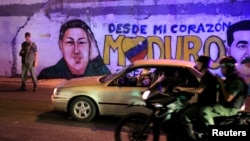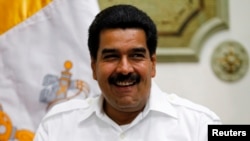CARACAS —
Wearing sports gear in the national colors and sitting on a sofa in a modest family home, Venezuelan President Nicolas Maduro holds a microphone, chats with locals and expounds on the benefits of socialism.
Variations of the scene — on a factory floor, playing soccer in the presidential palace or walking the plains with farmers — play daily on national TV as Hugo Chavez's successor makes "Gobierno en la Calle," or "Street Government," the chosen slogan of his rule.
Almost constantly on the road since being elected in April, Maduro has launched a plethora of new schemes, from raising the minimum wage to sending soldiers into city slums to fight crime.
Trumpeting his modest background as a bus driver and union activist, he continually reminds Venezuelans he is the South American nation's first "worker president," guaranteed to empathize with the poor and thus continue Chavez's legacy.
The avuncular images that Maduro, 50, has been promoting, however, cannot hide the tough realities he has inherited: an economy verging on recession, a ruling Socialist Party (PSUV) under some strains from within, and an impatient populace.
Such pressures make him vulnerable going forward, both to a newly confident opposition and potential rivals inside the PSUV, though there is no formal mechanism to challenge Maduro before a recall referendum allowed three years into his presidency.
"We're behind him, but he has to be behind us too, like Chavez was," said Eglis Rodriguez, a 39-year-old housewife and mother of three waiting to see Maduro at a "Street Government" event in the poor Macarao neighborhood on the edge of Caracas.
"He must not forget that he got in thanks to the votes of the poor," she said. "We put him there and we can remove him."
Far from enjoying a newly elected president's customary honeymoon, Maduro's ratings have stayed stuck around the level of his April 14 victory — by 50.6 percent to 49.1 against the opposition — or have even dropped, according to some pollsters.
He has struggled, sometimes awkwardly, to replicate Chavez's famous charisma and connection with the masses.
Maduro argues that his mentor's old foes in the private media and Venezuela's "fascist" right wing are doing their best to sabotage his government, from plotting to assassinate him to ignoring his flagship policies such as the drive against crime.
The opposition, delighted at winning nearly half the votes in April yet bitter at being deprived of the prize by what they claim was electoral fraud, says Maduro's incompetence and illegitimacy are ever more evident to Venezuelans.
Yet opposition leader Henrique Capriles' formal challenge to Maduro's election win is running out of steam: The election board ratified his loss after an audit and the Supreme Court is also likely to give short shrift to his allegations.
Though the United States has been lukewarm, Latin American neighbors have embraced Maduro as president.
Opposition waiting game
So Capriles, 40, appears to be biding his time and is casting local elections in December as a referendum on Maduro. Right now, though, most Venezuelans are more concerned with day-to-day economic realities than big-picture politics.
Shortages of basic goods ranging from toilet paper to flour have been an embarrassment to the government, while monthly price increases hit a 17-year high in May at more than six percent.
Growth in the OPEC nation slowed to a paltry 0.7 percent in the first quarter, despite high oil prices. And the local bolivar currency fetches five times more on the black market than at the official, controlled rate.
"When you shop now you have to queue for four hours. I never experienced that before. We were better with Chavez ... Maduro needs to get his skates on," said Carmen Natera, 60, another government supporter and mother of four, at the Macarao event.
The feistier attitude from grassroots supporters, who worshipped Chavez and would seldom criticize him directly, is reflected at all levels.
There is more criticism within the ruling party, where one faction revolves around the powerful Congress president and party No. 2, Diosdado Cabello.
The president is also sometimes openly challenged by the public at events.
And Venezuela's biggest private company, food and drinks maker Polar, which generally kept quiet in confrontations with Chavez, spoke out quickly when criticized by Maduro.
Amid it all, Maduro has lurched between fierce Chavez-style rhetoric and the pragmatism that many think comes more naturally to him.
In recent days, he has met business and church leaders to try and bury some hatchets from the Chavez era. And authorities have released from house arrest a judge whose detention since 2009 was a cause célèbre for human rights activists.
"Chavez was a military man and believed in defeating the enemy. Maduro was a union activist, he believes in negotiating with the enemy," said pollster Luis-Vicente Leon.
There has as yet been no rapprochement between Maduro and Capriles, and their bitter attacks on each other illustrate a political polarization as stark as at any time under Chavez.
Much now depends on how Maduro is able to handle the economy, and whether that will weigh further on his popularity or strengthen the Cabello-led faction within the PSUV.
With orthodox socialist heavyweights such as Planning Minister Jorge Giordani still wielding substantial influence while others push for liberalization, Maduro faces hard decisions about currency controls, price caps, and other once sacred cows.
The most famous aspect of Chavez's economic policy — nationalizations — appears to have been quietly shelved.
But Maduro may balk at the political cost of another devaluation, something many economists see as inevitable, or a loosening of the foreign exchange regime to get more dollars into the hands of importers.
Leon, the pollster, said the opposition actually had an interest in keeping Maduro in power until a 2016 referendum — as an earlier exit would more likely lead to a PSUV replacement.
"Their best chance is [a referendum] in three years against a Maduro who is destabilized but still in power," he said.
Variations of the scene — on a factory floor, playing soccer in the presidential palace or walking the plains with farmers — play daily on national TV as Hugo Chavez's successor makes "Gobierno en la Calle," or "Street Government," the chosen slogan of his rule.
Almost constantly on the road since being elected in April, Maduro has launched a plethora of new schemes, from raising the minimum wage to sending soldiers into city slums to fight crime.
Trumpeting his modest background as a bus driver and union activist, he continually reminds Venezuelans he is the South American nation's first "worker president," guaranteed to empathize with the poor and thus continue Chavez's legacy.
The avuncular images that Maduro, 50, has been promoting, however, cannot hide the tough realities he has inherited: an economy verging on recession, a ruling Socialist Party (PSUV) under some strains from within, and an impatient populace.
Such pressures make him vulnerable going forward, both to a newly confident opposition and potential rivals inside the PSUV, though there is no formal mechanism to challenge Maduro before a recall referendum allowed three years into his presidency.
"We're behind him, but he has to be behind us too, like Chavez was," said Eglis Rodriguez, a 39-year-old housewife and mother of three waiting to see Maduro at a "Street Government" event in the poor Macarao neighborhood on the edge of Caracas.
"He must not forget that he got in thanks to the votes of the poor," she said. "We put him there and we can remove him."
Far from enjoying a newly elected president's customary honeymoon, Maduro's ratings have stayed stuck around the level of his April 14 victory — by 50.6 percent to 49.1 against the opposition — or have even dropped, according to some pollsters.
He has struggled, sometimes awkwardly, to replicate Chavez's famous charisma and connection with the masses.
Maduro argues that his mentor's old foes in the private media and Venezuela's "fascist" right wing are doing their best to sabotage his government, from plotting to assassinate him to ignoring his flagship policies such as the drive against crime.
The opposition, delighted at winning nearly half the votes in April yet bitter at being deprived of the prize by what they claim was electoral fraud, says Maduro's incompetence and illegitimacy are ever more evident to Venezuelans.
Yet opposition leader Henrique Capriles' formal challenge to Maduro's election win is running out of steam: The election board ratified his loss after an audit and the Supreme Court is also likely to give short shrift to his allegations.
Though the United States has been lukewarm, Latin American neighbors have embraced Maduro as president.
Opposition waiting game
So Capriles, 40, appears to be biding his time and is casting local elections in December as a referendum on Maduro. Right now, though, most Venezuelans are more concerned with day-to-day economic realities than big-picture politics.
Shortages of basic goods ranging from toilet paper to flour have been an embarrassment to the government, while monthly price increases hit a 17-year high in May at more than six percent.
Growth in the OPEC nation slowed to a paltry 0.7 percent in the first quarter, despite high oil prices. And the local bolivar currency fetches five times more on the black market than at the official, controlled rate.
"When you shop now you have to queue for four hours. I never experienced that before. We were better with Chavez ... Maduro needs to get his skates on," said Carmen Natera, 60, another government supporter and mother of four, at the Macarao event.
The feistier attitude from grassroots supporters, who worshipped Chavez and would seldom criticize him directly, is reflected at all levels.
There is more criticism within the ruling party, where one faction revolves around the powerful Congress president and party No. 2, Diosdado Cabello.
The president is also sometimes openly challenged by the public at events.
And Venezuela's biggest private company, food and drinks maker Polar, which generally kept quiet in confrontations with Chavez, spoke out quickly when criticized by Maduro.
Amid it all, Maduro has lurched between fierce Chavez-style rhetoric and the pragmatism that many think comes more naturally to him.
In recent days, he has met business and church leaders to try and bury some hatchets from the Chavez era. And authorities have released from house arrest a judge whose detention since 2009 was a cause célèbre for human rights activists.
"Chavez was a military man and believed in defeating the enemy. Maduro was a union activist, he believes in negotiating with the enemy," said pollster Luis-Vicente Leon.
There has as yet been no rapprochement between Maduro and Capriles, and their bitter attacks on each other illustrate a political polarization as stark as at any time under Chavez.
Much now depends on how Maduro is able to handle the economy, and whether that will weigh further on his popularity or strengthen the Cabello-led faction within the PSUV.
With orthodox socialist heavyweights such as Planning Minister Jorge Giordani still wielding substantial influence while others push for liberalization, Maduro faces hard decisions about currency controls, price caps, and other once sacred cows.
The most famous aspect of Chavez's economic policy — nationalizations — appears to have been quietly shelved.
But Maduro may balk at the political cost of another devaluation, something many economists see as inevitable, or a loosening of the foreign exchange regime to get more dollars into the hands of importers.
Leon, the pollster, said the opposition actually had an interest in keeping Maduro in power until a 2016 referendum — as an earlier exit would more likely lead to a PSUV replacement.
"Their best chance is [a referendum] in three years against a Maduro who is destabilized but still in power," he said.












